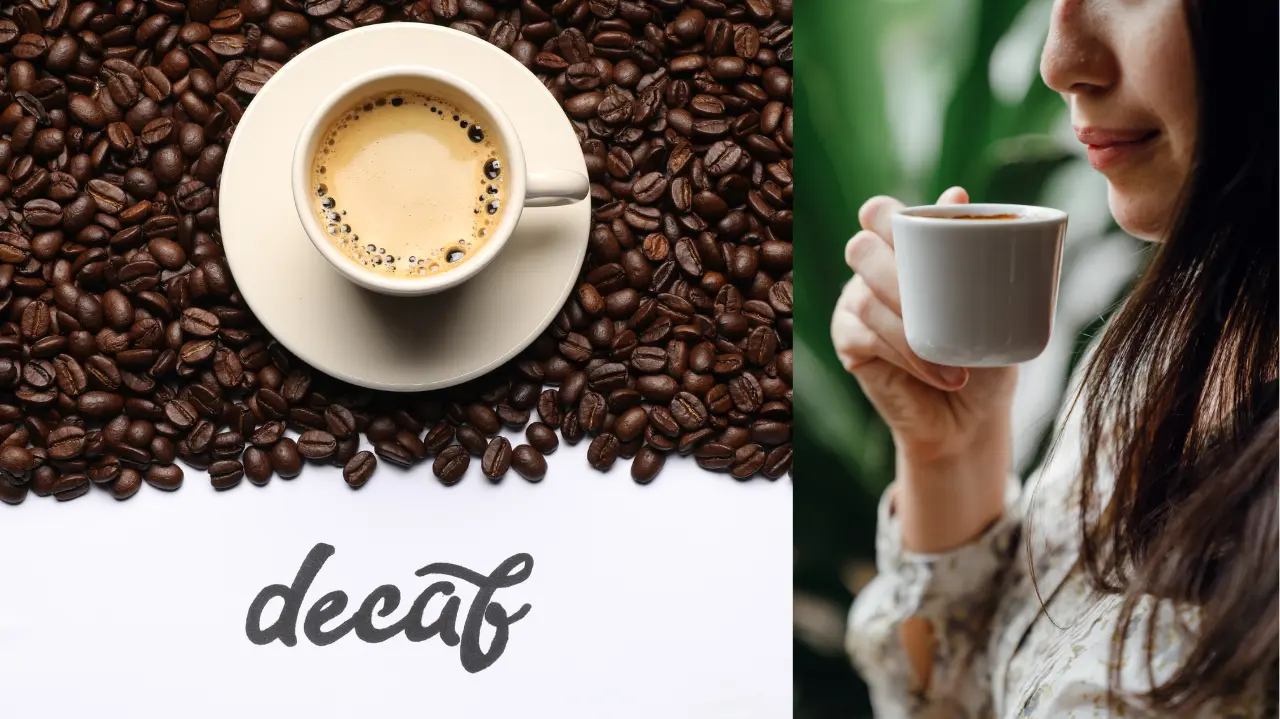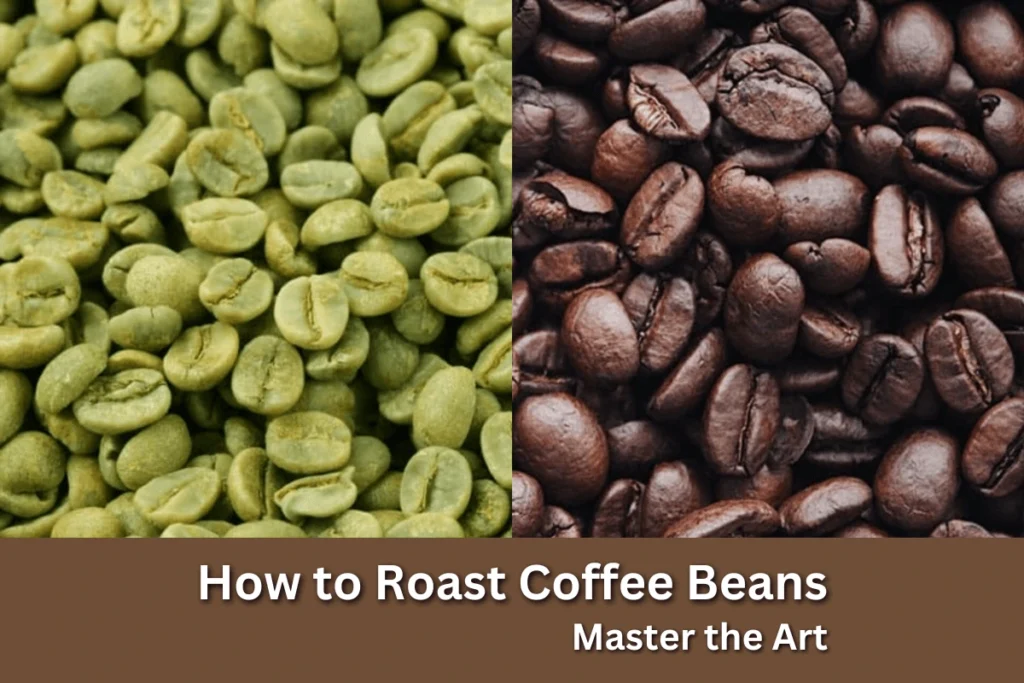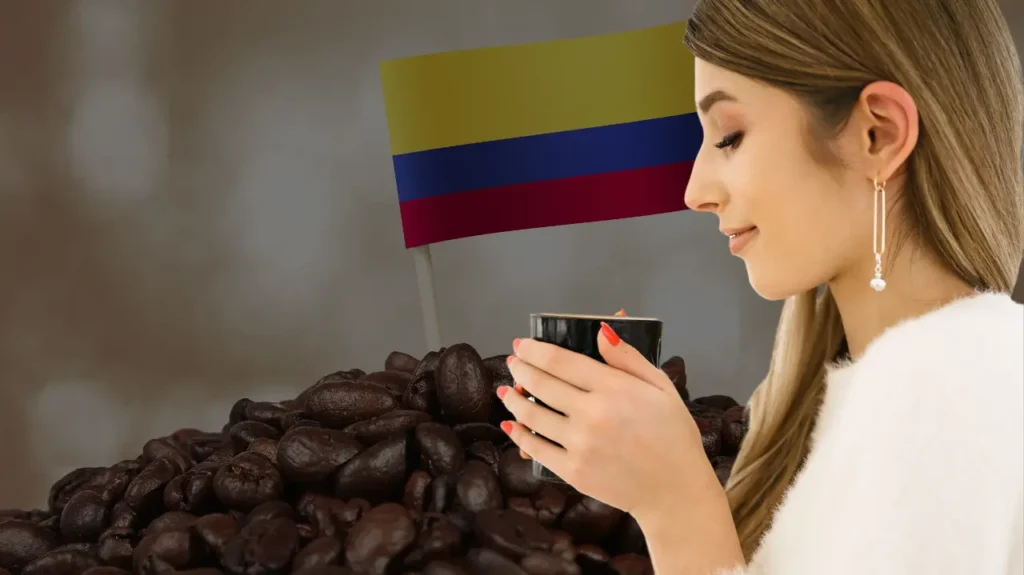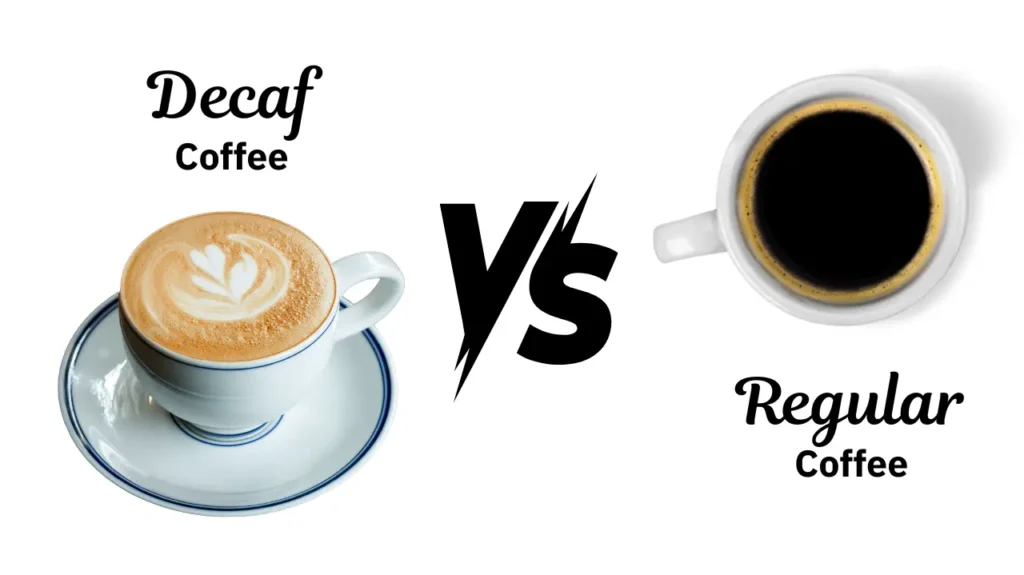Decaf coffee’s biggest crime? Being misunderstood. This may be why you are searching for a clue: Does decaf Coffee taste different?
Yes, it’s regular coffee with most caffeine removed, but here’s the twist: stripping caffeine changes the bean’s DNA. Imagine your favorite rock song played on an acoustic guitar. It has the same melody and softer edges.
Science confirms decaf often tastes milder and smoother. But hold up; high-quality decaf can mirror its caffeinated twin. I’ve cupped Swiss Water decafs that fooled seasoned baristas.
The catch? Most mass-market decaf sucks because producers use lousy beans and harsh methods.
This guide isn’t just about “yes” or “no.” It’s your backstage pass to why decaf varies wildly. We’ll dissect how caffeine removal hijacks flavour, why Reddit’s coffee geeks swear by certain roasters, and how to spot decaf that’s a flavour bomb, not a dud.
I’ve spent years cupping hundreds of decafs, from gas station grimace-water to small-batch masterpieces. Alongside lab studies and roaster interviews, I’ve mined forums where real drinkers drop truth bombs like: “My decaf Ethiopian tastes fruitier than my regular blend; fight me.”
Does Decaf Coffee Taste Different?
Let’s be honest; every coffee lover has wondered about this. “Does decaf coffee taste different?” I’ve fielded this question for years, often from regulars at my café who need to cut back on caffeine but refuse to sacrifice flavor.
The answer? Yes, decaf tastes different, but not in the way you might fear.
Here’s the thing: decaf isn’t a downgrade. It’s a variation. Think of it like swapping dark chocolate for milk chocolate.
Both are delicious, just distinct. The difference is how caffeine is stripped away, which can subtly alter flavor compounds. But with the right beans and brewing tricks, decaf can surprise you.
Take Sarah, a regular at my shop. She switched to decaf during pregnancy, dreading a bland experience. Then she tried our Swiss Water Process decaf, a Colombian roast with notes of caramel and toasted nuts.
“This tastes like real coffee,” she laughed. Her story isn’t unique.
Online forums like Reddit buzz with similar discoveries. One user raved about a local roaster’s decaf, calling it “shockingly rich.” Another admitted they’d avoided decaf for years, assuming it tasted “like dishwater,” only to find a chocolatey Ethiopian blend that changed their mind.
The gap between decaf and regular coffee isn’t fixed. It’s a spectrum. Cheap, mass-produced decaf often tastes flat, like a watered-down version of coffee. But speciality roasters?
They treat decaf beans with the same care as caffeinated ones. The result? Cups that hold their own.
Why does decaf vary so much? It’s all about how the caffeine is removed. Some methods strip flavour; others preserve it.
The Swiss Water Process, for instance, gently washes caffeine away using only water, leaving the bean’s natural oils intact. Cheaper methods? They might use chemicals that leave a faint aftertaste.
But here’s the kicker: your palate matters. Heavy cream drinkers might not notice a difference. Black coffee purists? They’ll detect subtler shifts in acidity or body.
The key is experimentation. Try different roasts, origins, and brew methods. Your perfect decaf is out there; finding it might take a few tries.
So, does decaf taste different? Absolutely. But different doesn’t mean worse.
It’s a chance to explore coffee’s quieter side, softer acidity, smoother finishes, and hidden flavors that caffeine sometimes overshadows. Approach decaf with curiosity, not scepticism. You might find a new favourite.
The Science Behind Decaf: How It’s Made and Why It Matters
Let’s cut through the jargon. Decaf coffee isn’t magic; it’s science. To make it, we strip caffeine from green coffee beans before roasting.
But here’s the catch: how you remove caffeine changes everything about flavor.
Three methods dominate the decaf world, and I’ve cupped them all. First up: the chemical method. Picture this: beans soaked in solvents like methylene chloride (the stuff in paint strippers).
It zaps caffeine fast but can steal flavour oils, too. Result? Decaf that tastes… polite. Not bad, just quieter.
Then there’s the Swiss Water Process; there are no chemicals here, just H2O and time. Beans soak in water saturated with coffee flavours, which pulls out caffeine but leaves taste compounds behind. It’s slower and pricier, but oh, the difference.
I’ve blind-tasted Swiss Water decafs that outshone regular blends.
The CO2 method? Think high-tech spa treatment. Pressurized carbon dioxide gently pries caffeine from beans.
It’s precise and flavour-friendly, but costs make it rare outside speciality roasters.
Real talk: your decaf’s taste hinges on which method was used. Reddit’s coffee nerds agree. One user raved about a Swiss Water Colombian: “Almost fooled me, it’s got that caramel punch.”
Another trashed solvent decaf: “Tastes like someone left regular coffee in the sun.”
Here’s the kicker: decaf isn’t “fake” coffee. It’s coffee minus one stimulant. Treat the beans right, and you’ll still get complexity, aroma, and soul-warming sip.
Skimp on the process? Well, that’s when decaf earns its bad rap.
Decoding the Flavor: How Decaf Compares to Regular Coffee
Let’s settle this once and for all: Does decaf taste like regular coffee? Close your eyes and imagine your favorite brew. Now, remove the caffeine. What’s left?
A quieter version of the same song, same melody, softer notes.
Regular coffee hits you with caffeine’s bitter punch. Decaf? It’s the smooth cousin.
Less bite, more glide. That missing bitterness lets subtler flavours shine, caramel whispers, and chocolate murmurs. But some miss the edge, like decaf’s playing coffee on mute.
Acidity tells another story. Regular coffee’s bright, tangy zing? Decaf dials it down. Think lemonade vs still water. It’s easier on sensitive stomachs but lacks that wake-up call for your taste buds.
Body matters, too. Decaf often feels thinner, like skim milk vs whole. The decaffeination process steals some oils that give coffee its velvety weight.
It’s why espresso lovers might find decaf underwhelming, with less crema and a lighter mouthfeel.
Smell a freshly brewed cup. Regular coffee’s aroma slaps you with nostalgia. Decaf? It’s shy.
Volatile compounds vanish during processing, leaving a ghost of the original scent. And the aftertaste? Decaf’s goodbye is quick, while regular lingers like a fond memory.
But here’s the twist: your taste buds write the rules. Add milk or syrup, and differences blur. A barista friend told me, “Half my customers can’t spot decaf in a latte; it’s all about the extras.”
Reddit’s coffee crowd agrees. One user swore their café’s decaf tasted “sharp, almost sour” compared to regular. Another argued, “My Swiss Water decaf’s so smooth, I prefer it now.”
Personal bias? Maybe. But that’s the beauty; decaf’s not worse; it’s just different.
High-quality decaf bridges the gap. I’ve cupped Ethiopian decafs with floral highs that rival their caffeinated twins. It’s all about the beans and the care taken.
Cheap decaf? Yeah, it’ll taste like regret in a mug. But treat it right, and decaf becomes its own experience, not a compromise, but a choice.
Why Does Decaf Coffee Taste Different?
Decaf’s flavour starts with a theft. To yank out caffeine, processors also swipe flavor compounds. It’s like trying to remove salt from soup without losing taste.
Chemical methods? They’re the bullies, stripping oils and acids that give coffee its soul. What’s left? It’s a timid version of the original.
Decaf beans are drama queens. They’re fragile, scorching easily in roasters. Imagine baking cookies that burn if you blink; that’s decaf.
Roasters tweak temperatures, often going darker to hide flaws. Result? Smoky notes overshadow the bean’s authentic voice. Go lighter, though, and process imperfections glare.
Reddit’s coffee rebels confirm this. One user griped about Swiss Water decaf tasting “like a lumberyard,” while another praised a CO2-processed decaf’s “velvety finish.” Both prove the same point: how you decaffeinate matters more than why.
Here’s the kicker: decaf’s not “watered down.” It’s reshaped. Without caffeine’s bitter backbone, flavours like caramel or hazelnut step forward. But if the beans were low-grade to start with? You’ll taste the void.
A roaster friend bluntly said, “Great decaf costs more because it’s harder to make. Cheap decaf? That’s where the ‘flat’ myth comes from.” So yes, decaf tastes different.
But different isn’t bad; it’s a chance to taste coffee without the loudmouth of caffeine stealing the show.
Tips for Choosing and Brewing the Best Cup
Decaf can sing if you know how to conduct it. Start by hunting for speciality-grade beans, and look for “Swiss Water” or “CO2 Process” on the bag. These methods treat beans like VIPs, preserving flavours that cheap decafs strip away.
Roast level? Medium’s your friend. Dark roasts hide flaws under smoke, while light roasts spotlight them.
A Colombian medium roast decaf I tried recently had notes of brown sugar and almonds, no bitterness, all charm.
Brewing’s where magic happens. French press or pour-over? Yes.
These methods coax out oils that machines might miss. One customer said her pour-over decaf tasted “like a hug from a coffee bean.”
Freshness is non-negotiable. Decaf beans go stale faster; grind them right before brewing. Think of it like bread: day-old baguette vs just-baked. You’ll taste the difference.
Play with origins. Latin American decafs? Chocolate vibes. African? Fruity highs. A regular at my café mixes 50% Brazilian and 50% Ethiopian for what he calls “decaf bliss.”
Reddit’s full of hacks. One user blends a pinch of regular coffee into decaf: “It’s like training wheels for flavor.” Another swear by colder water for iced decaf, “smoother, zero bitterness.”
Debunking Decaf Myths: Separating Fact from Fiction
There are plenty of myths about decaf coffee that can cloud your perception of its taste. Let’s clear them up, addressing whether decaf coffee is bitter and other misconceptions:
Decaf is not completely caffeine-free; it still contains trace amounts, usually 2-5 mg per cup compared to 70-100 mg in regular coffee, which is why some might still feel a slight energy boost, though minimal.
The myth that decaf always tastes bad is far from true; poorly made decaf can taste flat or chemical, but high-quality decaf can be just as delicious as regular coffee; answering whether decaf coffee tastes different with clarity, it’s not inherently worse, just different.
Another myth is that decaf is only for non-coffee lovers; many enthusiasts enjoy it for its smoother profile or to reduce caffeine without losing their favourite drink, addressing why decaf coffee tastes different as a matter of preference rather than quality.
Forum discussions often debunk these myths, with users sharing, “I thought decaf was disgusting, but then I tried a high-quality CO2-processed decaf, and it changed my mind.”
Insights from the Pros: What Coffee Experts Say About Decaf
Coffee experts often emphasize that quality and care are the keys to great-tasting decaf. For instance, many speciality roasters now offer decaf options praised for their flavour profiles, rivalling those of their caffeinated counterparts.
Baristas recommend trying decaf espresso, as its concentrated nature highlights the coffee’s nuances, addressing decaf vs regular coffee taste with a focus on preparation.
Studies support this; research on the Swiss Water Process shows it removes up to 99% of caffeine while preserving aroma volatiles, making it a top choice for flavor retention (study on aroma volatiles).
Roasters like Public Domain Coffee are known for high-quality decafs, such as Decaf Blue Hour, offering rich flavours like baker’s chocolate and tart apple notes, helping answer whether decaf coffee tastes different with examples of excellence.
Real-life examples from forums align with this. One user shared, “I think that with a quality decaf, like those discussed in Reddit threads, they can taste amazing.
If your doctor tells you to cut caffeine, you don’t have to give up being a coffee aficionado.” This reinforces the expert view that decaf can be a viable alternative.
The Health Perks of Decaf
Decaf isn’t just a consolation prize. It’s a health hack disguised as coffee. Those same antioxidants that make regular coffee a superhero?
They’re still in decaf, fighting off cell damage like tiny bodyguards. Studies even link it to lower risks of diabetes and some cancers. Not bad for a “watered-down” brew, right?
Here’s the kicker: your brain might not care it’s decaf. The ritual, steam rising, and the first sip of warmth trigger the same mood boost as regular coffee.
It’s like placebo magic. One customer told me, “I still get my 3 PM ‘coffee joy’ without the jitters. My brain thinks it’s winning.”
But here’s a heads up: decaf’s not zero caffeine. Trace amounts linger about what you’d get nibbling a square of dark chocolate. For most, it’s harmless. But if even a whiff of caffeine rattles you? Sip slowly.
Reddit’s full of converts. One user wrote, “Switched to decaf for anxiety, ended up loving the smoother taste. Now I drink it by choice.” That’s the thing: decaf’s not a downgrade. It’s a side quest with its rewards.
So yes, decaf tastes different. But when health’s the priority, that difference becomes a perk, not a flaw. Your heart, nerves, and future self might thank you.
Exploring Different Varieties and Flavors
Think decaf’s boring? Think again. It’s a globe-trotting adventure in a cup. Grab your “decaf passport”, and let’s explore.
Latin American decaf is your cosy comfort blanket, smooth, nutty, with caramel hugs. Perfect for rainy mornings. African decaf?
That’s the life of the party. Bright, fruity, like biting into a sun-ripened peach. I once served a Kenyan decaf that a customer swore tasted like “blueberry pie without the crust.”
Asian decaf walks the earthy side. Think damp forest floors or jasmine tea steam. A Sumatran decaf regular at my café calls it “meditation in a mug.”
Reddit’s coffee explorers agree. One user raved about an Ethiopian decaf: “It’s got that floral kick I love in regular Yirgacheffe, just no caffeine crash.”
Moral? Decaf is not a monolith. It’s a spectrum waiting for your palate to map it.
Brew Like a Pro: Techniques for Perfect Decaf Coffee
Brewing decaf isn’t rocket science; it’s more like baking sourdough. Precision meets patience. Here’s how to nail it:
Water temp’s your first dance partner. Too hot (over 200°F), and decaf gets bitter. Too cold, and it’s underwhelming.
Aim for the Goldilocks zone, 195°F to 200°F. Think “just off the boil,” like waiting 30 seconds after the kettle screams.
Grind size? Match it to your method. French press needs coarse grains; think sea salt. Espresso demands powder-fine grit. Get this wrong, and the decaf turns watery or muddy.
A regular at my shop grinds decaf twice for espresso: “First coarse, then fine. It’s extra, but the crema’s worth it.”
Time your brew like a subway commute. It is too short (under 3 minutes for pour-over), and the flavours stay shy. Too long (over 5), and bitterness gatecrashes. Four minutes is the sweet spot for most methods.
Store beans like fresh herbs. Air-tight jar. Cool, dark shelf. Not the fridge; condensation murders flavour. One Reddit hack: “Use smaller bags so you finish decaf faster. Stale decaf tastes like cardboard regrets.”
Master these, and decaf becomes a revelation. As one forum user bragged: “My friends can’t believe my decaf pour-over tastes better than their gas station brew.”
Conclusion
So, does decaf coffee taste different? Yes, it often does, but that doesn’t mean it’s worse. Decaf’s milder, smoother profile can be just as enjoyable with the right beans and brewing techniques.
By understanding how decaf is made, why it tastes different, and learning from the experiences of other coffee lovers, you can enjoy a cup that’s every bit as satisfying as your favourite caffeinated brew.
Whether you’re a long-time decaf drinker or just curious about trying it, a world of flavor awaits you. So, experiment, explore, and find your perfect cup.
After all, the best coffee, decaf or regular, is the one you love most, addressing whether decaf coffee tastes stronger or weaker based on your journey.




